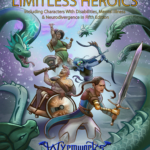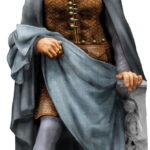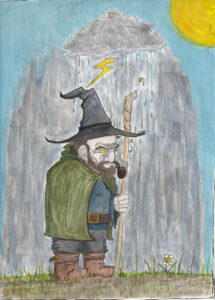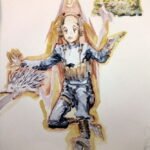Eating Disruption

You have a troubled relationship with food. Choose or roll on the following table.
function displayRandom() { const eatingDisorders = [ 'Anorexia', 'Anorexia', 'Anorexia', 'Anorexia', 'Avoidant/Restrictive Food Intake', 'Avoidant/Restrictive Food Intake', 'Avoidant/Restrictive Food Intake', 'Binge Eating', 'Binge Eating', 'Binge Eating', 'Binge Eating', 'Bulimia', 'Bulimia', 'Bulimia', 'Night Eating', 'Night Eating', 'Orthorexia', 'Orthorexia', 'Pica', 'Rumination' ]; const randomIndex = Math.floor(Math.random() * eatingDisorders.length); const randomDisorder = eatingDisorders[randomIndex]; document.getElementById("eating-disorder").innerHTML = randomDisorder; }
| d20 | Trait |
|---|---|
| 1–4 | Anorexia |
| 5–7 | Avoidant/Restrictive Food Intake |
| 8–11 | Binge Eating |
| 12–14 | Bulimia |
| 15–16 | Night Eating |
| 17–18 | Orthorexia |
| 19 | Pica |
| 20 | Rumination |
- Anorexia. You avoid eating or eating certain foods due to a fear of gaining weight. When it’s time to eat, if you attempt to voluntarily or involuntarily eat a meal, you must succeed on a DC (IE) × 2 + 8 Wisdom saving throw or be unable to force yourself to. On success, you are able to eat a meal, but then must succeed on a DC (IE) × 2 + 5 Constitution saving throw or experience Baseless Emotion (Guilt) or Baseless Emotion (Panic) until you succeed on the saving throw, which you may make every (IE) × 10 minutes. Consult p. 87 of the Basic Rules or other fifth edition sources for the effects of not eating enough.
- Avoidant/Restrictive Food Intake. You avoid eating many foods either due to finding many foods distasteful possibly due to sensory reasons, or a fear that something bad might happen while eating them such as choking. Work with your GM to develop a list of 4d4 ÷ (IE) specific foods that you can eat without a problem. When it’s time to eat anything else, you must succeed on a DC (IE) × 2 + 8 Wisdom saving throw or be unable to force yourself to. Consult p. 87 of the Basic Rules or other fifth edition sources for the effects of not eating enough.
- Binge Eating. When you begin eating and have the opportunity, you will quickly continue to eat until uncomfortably full due to stress, anxiety, depression, or low self-esteem. To limit your eating to a healthy amount, you must succeed on a DC 10 + (IE) Wisdom saving throw. Following an eating binge, you feel lethargic and have a −(IE) penalty on initiative rolls for (IE) hours after. Every seven days of binging, your weight increases by one percent, and for every twenty percent increase, you experience a −1 penalty on Strength (Athletics) and Dexterity (Acrobatics) checks. If you have multiple traits, you may choose Baseless Emotion as one of them.
- Bulimia. Every 1d4 days, due to a fear of gaining weight, you eat large amounts of food until painfully full, then you purge it via vomiting, consuming a known laxative, or doing intense exercise during the next long rest. You must succeed on a DC (IE) × 2 + 8 Wisdom saving throw to avoid this behavior. This behavior results in damage to the digestive system. For every one hundred days of purging, you must succeed on a DC 8 + (IE) Constitution saving throw or develop a new Periodic IE 1 Digestive trait or, if you already have one, it increases by 1 IE up to IE 4, after which the frequency begins to increase. Five days of successfully avoiding purging will allow the body to heal one day of the cumulative total. Once the one-hundred-day threshold is met, the tally starts over, and the trait change becomes permanent unless you can refrain from purging for one hundred days, which reverses the effect by one frequency level until in remission. If you have multiple traits, you may choose Baseless Emotion as one of them.
- Night Eating. Similar to Binge Eating, you eat excessively, but during a long rest, 1d6 hours after falling asleep or the equivalent. This disrupts the long rest and requires starting the rest over after eating due to indigestion. To limit your eating behavior, you must succeed on a DC 10 + (IE) Wisdom saving throw. Following an eating binge, you feel lethargic and have a −(IE) penalty on initiative rolls for (IE) hours after. Every seven days of binging, your weight increases by one percent, and for every twenty percent increase, you experience a −1 penalty on Strength (Athletics) and Dexterity (Acrobatics) checks.
- Orthorexia. You obsess over eating healthily according to a self-imposed diet not dictated by religion or culture due to past trauma, unhealthy relationships, anxiety, fearing a loss of control, low self-esteem or other internal conflicts. This leads to (IE) of the following accompanying traits:
- Not eating enough food or the right kinds (See p. 87 of the Basic Rules or other fifth edition sources for the effects of not eating enough.)
- Inability to eat in public, requiring a successful DC 10 + (IE) Constitution check to force yourself to do so
- A Baseless Emotion based on not living up to your personal expectations. (This trait can be chosen more than once, reflecting multiple emotions)
- Pica. You crave non-food substances such as ice, dirt, soap, paper, hair, cloth, pebbles, or other materials that are not part of any cultural practice due to either mental health related reasons or malnourishment such as an iron deficiency. Every day, you must succeed on (IE) Constitution saving throws or consume (IE) ounces of the material when available. Depending on the material and quantity, the GM should determine whether a Constitution saving throw against poison is necessary. A typical effect of many materials results in Diarrhea on a failed DC 10 + (IE) Constitution saving throw. You might feel shame for indulging in your craving and try to do so in secret.
- Rumination. After eating, you regurgitate food, re-chew it, and either swallow or spit it out. As adults are more likely to spit it out than swallow it, besides bad breath and damage to the mouth and esophagus, you also risk the effects of not eating enough as with Anorexia and the long-term negative effects of Bulimia at the GM’s discretion. When you eat, you must succeed on a DC (IE) × 2 + 8 Wisdom saving throw to avoid this behavior. You experience a −(IE) penalty on all Charisma (Persuasion) checks for an hour after eating.
Real-world Examples
Anorexia Nervosa, Avoidant/Restrictive Food Intake Disorder, Binge Eating Disorder, Bulimia Nervosa, Night Eating Syndrome, Pica, Rumination Disorder
Assistive Options
The most important assistance for any of these is support from friends and allies, and a friend who has committed to helping and uses at least a short rest each day to offer encouragement and support gives advantage on saving throws on harmful urges for the day. Attempts by others to force a certain behavior will not eliminate the urge and will give you disadvantage on the next saving throw to resist.
Magical Assistance
The Goodberry spell can assist with malnutrition but still requires the same checks as other foods to consume and retain.

 You have the overwhelming feeling that your circumstances will only get worse, either your immediate circumstances or your entire life or both (and which of those doesn’t matter). While experiencing this, you lose advantage on all ability checks.
You have the overwhelming feeling that your circumstances will only get worse, either your immediate circumstances or your entire life or both (and which of those doesn’t matter). While experiencing this, you lose advantage on all ability checks.